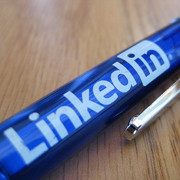One has to give  LinkedIn credit for trying to be more than just a network of vague business connections. They have a difficult challenge: Investors and advertisers value them more on membership numbers than on the quality of the connections in the network, yet the quality of the network is the primary value for those members.
LinkedIn credit for trying to be more than just a network of vague business connections. They have a difficult challenge: Investors and advertisers value them more on membership numbers than on the quality of the connections in the network, yet the quality of the network is the primary value for those members.
Over the years, LinkedIn has implemented several features designed to encourage membership, relaxing the emphasis on “only link to people you trust” but at the same time attempting to add value back with recommendations, and now skill endorsements.
The problem with recommendations is that they’re not spontaneous. While someone might be more than happy to write a recommendation, they’re not likely to do it without being prompted, and many people aren’t comfortable with asking their connections to write one. There’s also a problem with quid pro quo recommendations, where two people who vaguely know each other agree to write recommendations for each other despite not having a deep relationship. Although these generic recommendations are usually pretty easy to spot, the noise devalues the entire system.
Recently, LinkedIn introduced a much simpler system: LinkedIn Endorsements. One member can endorse another member’s skills simply by clicking on them. Initially I thought this was a great idea, but it was not long before I found that some of my new connections were endorsing me for skills that I’d never delivered to them. While I appreciate the endorsement for something like “Email Marketing”, it’s kind of empty if we haven’t even exchanged mail yet. The fear is that when this happens endorsements merely give members a micro version of the same problem LinkedIn has: they become a numbers game, not a representation of value.
Ever the cynic, I promptly added “Getting Bogus Endorsements” to my list of skills, and distributed notice of this through my social networks. My expectation was that this new skill would rapidly rise up to become one of the most popular in my profile. I was wrong. Although the move garnered a lot of comments, it has only attracted three endorsements so far. Meanwhile I’ve received nine or ten comments on the move.
Granted it’s a small sample size, but this suggests that at this point in time, about 60% of LinkedIn users are taking the endorsements system seriously, and that they have some actual value. One can only hope that this remains true over time.
Image Credit: Flickr user shielascarborough. Used under a CC license.
Recent Comments